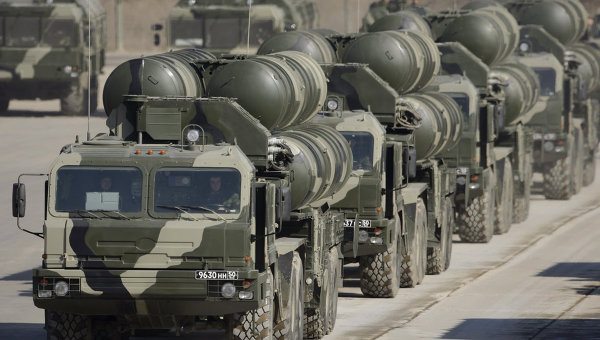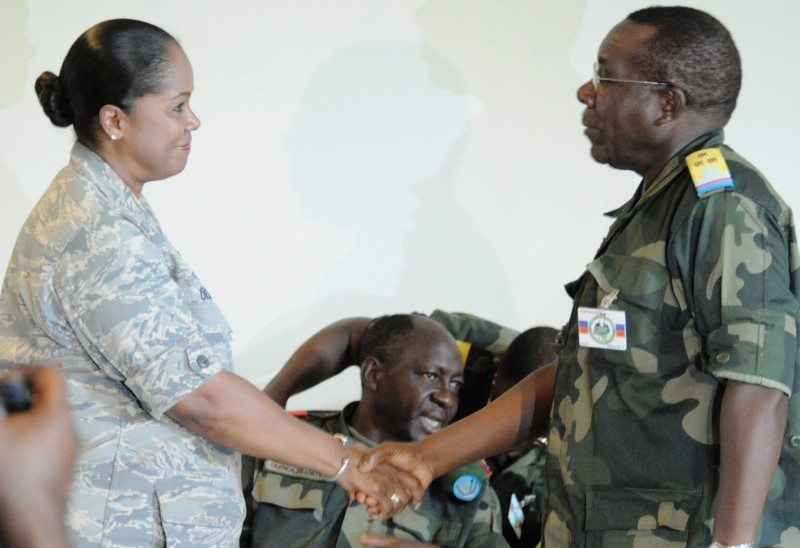Some 20,000 soldiers and Russia’s most advanced missiles rumbled across Red Square on Monday in a parade marking victory in World War II and reinforcing the country’s belief in its Soviet-era might.
But the lustre of the annual show of force was somewhat dimmed by renewed doubts about the wisdom of staging the costly exhibition and reports that Islamists were planning to undermine the celebration by staging new attacks.
A well-rehearsed 1,500-piece orchestra set the tone to the procession by booming out festive marches as President Dmitry Medvedev and Prime Minister Vladimir Putin watched from a podium in front of Lenin’s mausoleum.
“The further these years are removed, the deeper our understanding of the heroic exploits of our military generation — its bravery, willpower and self-sacrifice,” Medvedev said in remarks broadcast live across the nation.
“You decided the fate of World War II,” he told the small group of veterans in attendance. “Today we mark the holiest of our holidays and thank you for our freedom.”
Medvedev and Putin — both being watched under a political microscope with presidential elections less than a year away — sat side by side and exchanged a few comments as soldiers goose-stepped across the polished cobblestone.
Putin did not address the gathering while Medvedev ended the hour-long ceremony by spending a few minutes shaking hands with some of Russia’s most elite troops.
The 66th anniversary of victory over Nazi Germany began with jets seeding the clouds around Moscow to stave off any rain and culminated in a display of the latest line of Topol-M missiles — the pride of Russia’s nuclear defences.
The Kremlin resumed the tradition of rolling out its most feared weapons for the annual event in 2008 at a time of renewed confidence that coincided with a booming economy and a sense of Russia having recaptured its global prestige.
Those parades continued through the subsequent global financial crisis and Russia’s cautious recovery from it has left some wondering whether the scale of the festivities was still worth the price.
Medvedev brushed aside those sceptics as he downed an obligatory shot of vodka and shared a simple meal of buckwheat with a small group of World War II veterans on the eve of the parade.
“Parades play an enormous instructional role in our country,” the Russian president noted.
Medvedev has burnished a reformist image but has had more trouble winning the trust of Russia’s more nationalist forces as he ponders whether to seek re-election in polls scheduled for March.
His term has been hurt by periodic attacks from Islamists and persistent rumours that his predecessor and mentor Putin not only wielded the real power but also harboured plans to return to the Kremlin next year.
Security issues returned to the forefront in January when a suicide bomber killed 37 people at a Moscow airport. The warlord who claimed responsibility has vowed to carry out fresh strikes in the weeks and months to come.
Police said they may have foiled one such attack over the weekend when they staged a security sweep in the previously peaceful southern city of Astrakhan. One suspected militant was killed and dozens more were arrested.
Medvedev told a post-parade reception at the Kremlin that the nature of security threats facing Russia has changed since the Great Patriotic War — the term former Soviet republics use to refer to the 1941-45 campaign.
“Today’s world still faces the threat of conflicts, the threat of international terrorism,” ITAR-TASS quoted Medvedev as saying.
“Humanity can only overcome these problems jointly.”











